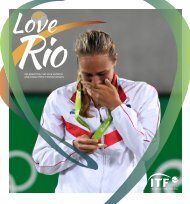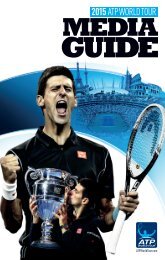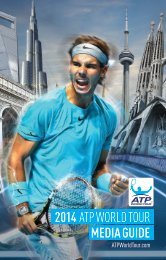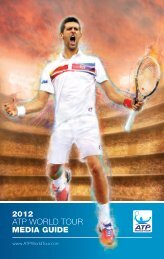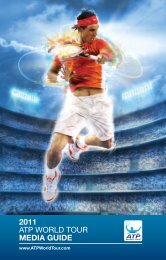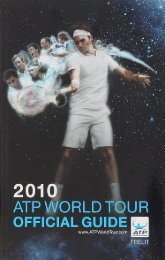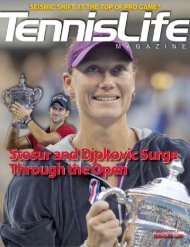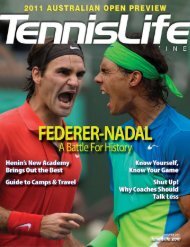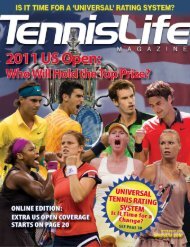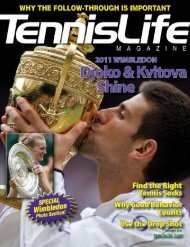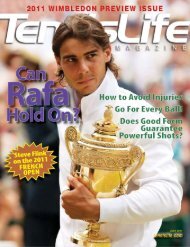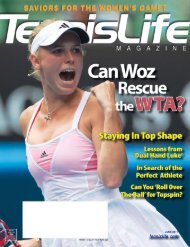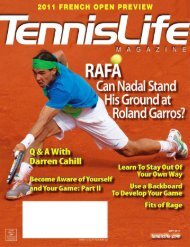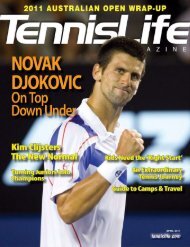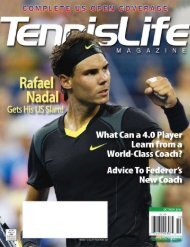A Champion's Mind - Pete Sampras
www.tennismoscow.me Insta:TENNISMOSCOW
www.tennismoscow.me Insta:TENNISMOSCOW
You also want an ePaper? Increase the reach of your titles
YUMPU automatically turns print PDFs into web optimized ePapers that Google loves.
Indianapolis or Lyon. It’s a bummer to play for a place in a Grand Slam final under those conditions.<br />
The upshot of the scheduling was that I didn’t have that great atmosphere to pull me through. The<br />
serious and passionate fans who come during the early rounds are scarcer when the corporate crowd<br />
decides to start paying attention (usually from the quarterfinals on). The lack of atmosphere threw me, and<br />
so did the conditions. It was hot; the sun was blazing in a cloudless sky, and there wasn’t the slightest<br />
breeze. Of course, a fast, sun-baked court would help my game, but the heat could also drain me in a long<br />
clay-court grind.<br />
As it turned out, I didn’t have to worry about stamina. I served well at the start, picked my spots to<br />
attack, and made good use of my forehand to force the action. Kafelnikov hung in there without worrying<br />
me. We went to the first-set tiebreaker and it was close, but I lost it—theoretically, no big deal. And then<br />
everything just imploded. I didn’t get a game in the next set, and won just two in the third. It was by far my<br />
most puzzling and distressing Grand Slam loss, and it occurred against a guy with a tendency to get tight in<br />
big matches—especially against me.<br />
I still can’t really explain why the wheels fell off. I just hit an unexpected physical and mental wall. I<br />
was powerless to play better. I believe it had something to do with diet, which would help explain those<br />
bizarre cravings I’d had—and suppressed. Whatever the reason, I just had nothing left, and I knew it as<br />
those games rolled by. That’s truly a terrible feeling, especially when you’ve got twenty thousand people<br />
watching live, and millions more watching on television. Even more especially when the ongoing story of<br />
my unstated but very real desire to win it for Tim was such an obvious part of the plot. I had nothing in my<br />
legs, nothing in my head, nothing left anywhere. And when the mercy killing finally was over, it only felt<br />
worse. I felt empty like I never had before, utterly depleted.<br />
I was stunned. Down deep, I’d felt that it was my time at the French Open, and that was all bound up<br />
with having lost Tim. I thought it was meant to be, especially after my wins over two worthy former<br />
champions. During that entire tournament, I felt like Tim was still alive. Tim and I were going to win the<br />
French—it was going to be another team effort, like getting over the hump and winning Wimbledon. I’d<br />
even had these conversations with him in my head during my matches at Roland Garros, and they helped<br />
pull me through.<br />
During the Kafelnikov match, however, there was nothing but a resounding, deep silence. I didn’t think<br />
about this during the match, but I guess the silence probably settled in because my attempt to hold on to<br />
Tim, my fantasy that I could keep him alive, expired. Despite having been to Tim’s funeral, I hadn’t really<br />
faced up to or accepted the fact that he was gone. Two matches too soon, I had a devastating reality check.<br />
When I hit the wall against Kafelnikov, and felt my dream—our dream—blow up in my face, it really<br />
did sink in. Tim was gone. Our dream was gone. It was gone for good.<br />
If anything good came out of Tim being gone, it was that Paul was finally free to shed that “interim coach”<br />
label and carry on as my full-time coach, a job he had accepted when we discussed the subject in the last<br />
days of Tim’s life.<br />
Paul had been a solid, crafty pro with an interesting game. He didn’t move all that well and his ground<br />
strokes were suspect; I always kidded him about having to recruit practice partners because he just<br />
couldn’t keep enough ground strokes in play to give me a workout. But Paul had a great feeling for the<br />
game, a fine serve, and a terrific volley. He lived by his wits, specializing in kamikaze tennis as a chipand-charge<br />
player who was always betting that he could get to the net and make more volleys than an<br />
opponent could make great returns and passing shots. It was not an easy technique to execute; on a bad<br />
day, you could look downright foolish, kind of like a cavalry on horseback charging a tank battalion. He<br />
was one of the last great practitioners of that style.<br />
When chip-and-charge tennis worked, it was a bold and exciting thing to behold. It created enormous



